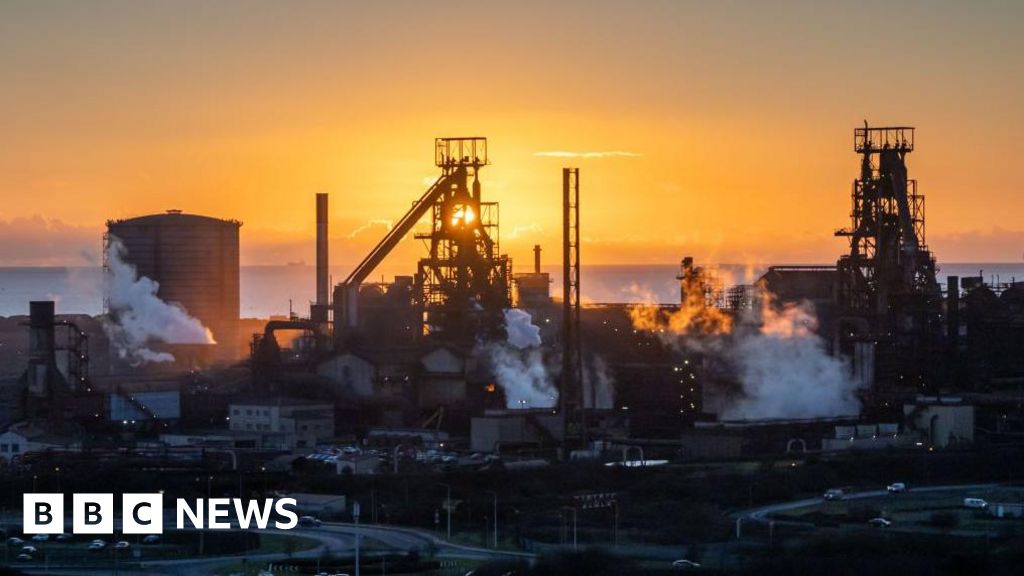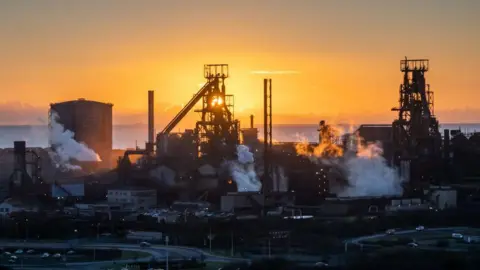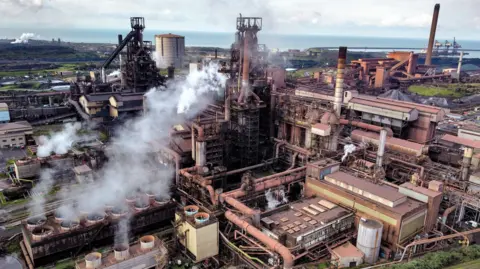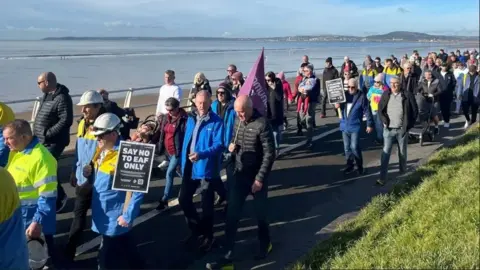Tata steel: Strike could shut much of Port Talbot plant early

By Mark Palmer, BBC News
 Getty Images
Getty ImagesWorkers at Tata Steel have been told the company is taking steps to potentially cease operations at much of the Port Talbot plant by 7 July because of a strike by the trade union Unite.
The company had originally been planning to shut one of the blast furnaces by the end of June and the second one by September.
But Port Talbot workers have been told that because of the strike from 8 July, the company can no longer be assured of sufficient resources being available to ensure safe and stable operations.
The Unite union said Tata’s statement to shut or pause the blast furnaces three months earlier than intended was the latest in a long line of threats and it would not deter them.
The Welsh government said it cannot and will not support the closure of both blast furnaces.
Last week the Unite union announced that about 1,500 workers would begin an indefinite strike on 8 July over the company’s plans to cut thousands of jobs.
Onay Kasab, the national lead for Unite, told Radio Wales Breakfast that the union was due to have a conversation with the company regarding safety during the strike.
Mr Kasab denied if the union had given the company an opportunity to shut the site.
“What other option have we got when we are facing 2,800 job losses. We have said to Tata, again and again, ‘wait for a general election, wait for a new Labour government'” he said.
Mr Kasab said the union have a letter from the company asking the union to wait until after the general election for discussions to take place.
However, the company previously said it would not be changing course in Port Talbot, regardless of who wins the general election.
About 2,800 Tata Steel workers will lose their jobs when the company closes both blast furnaces in Port Talbot by the end of September.
At the time, the company said if the strike affected the safety or stability of its operations it would be “forced” to accelerate closure plans.
A spokesperson for Tata said: “Following the announcement by Unite union to unilaterally call strike action from 8 July, Tata Steel is unfortunately forced to commence legal action to challenge the validity of Unite’s ballot.
“In the coming days, if we cannot be certain that we are able to continue to safely and stably operate our assets through the period of strike action, we will not have any choice but to pause or stop heavy end operations [including both blast furnaces] on the Port Talbot site.
“That is not a decision we would take lightly, and we recognise that it would prove extremely costly and disruptive throughout the supply chain, but the safety of people on or around our sites will always take priority over everything else.”
Tata said it is again calling on Unite to withdraw its industrial action and join Community and GMB unions in “giving consideration” to the company’s proposal, which Tata said includes “generous employee support packages, training and skills development”.
It said it “understands” the impact the restructuring will have on many employees and contractors, but that it “remains committed to a just transition” and hopes for a “long and sustainable future” in the UK.
The company plans to build a £1.25bn electric arc furnace to produce steel in a way which is less polluting than traditional blast furnaces but requires fewer workers.
Tata said the move would secure the future of steelmaking at the site and the UK government is contributing £500m towards the cost of the project.
The plans for the site will see both furnaces shut down. Number five will go off by the end of next week as planned while four is due to go off by the end of September.
Preparatory work to shut down five will begin by 1 July if the strike goes ahead.
Other elements that will close include the harbour, sinter plant, ore yards and primary steelmaking.
 PA Media
PA MediaSharon Graham, the Unite general secretary, said the union is “fighting for the future of the steel industry”.
She said Unite has secured “serious investment” from Labour to safeguard jobs.
“Tata putting out a statement to shut or pause its blast furnaces three months earlier than they intended to is the latest in a long line of threats that won’t deter us.
“The Unite campaign is not about selling jobs, it’s about securing the long-term future of steel making in this country for thousands of workers in Port Talbot and South Wales.”
Unite said it is calling on the “real decision makers” in Mumbai to realise that “the investment secured will be good for the company and workers.”
GMB union said Tata must “step back” from this “irreversible decision” and instead “safeguard steelmaking assets”.
GMB national officer, Charlotte Brumpton-Childs, said that the upcoming general election could “change so much”, and that GMB’s next actions would be decided by its members.
The Community union condemned Tata’s “unacceptable” decision to bring forward the closure and said it continued to support the Labour Party’s call for Tata not to make irreversible decisions before the general election.
Analysis by Ben Price, BBC Wales News
Developments have escalated quickly in the past two weeks.
Unite is one of three unions which represents steelworkers and it has so far been the most militant in its action in the face of significant job cuts across Tata’s UK operations.
Members are currently working to rule and there’s a ban on any overtime.
However, the decision to walk out indefinitely is an escalation which now potentially threatens the early closure of the UK’s largest steelmaking operation in Port Talbot.
Tata says it would have no option but to close if the strike goes ahead, but in the meantime the company has filed for an injunction at the High Court to try to prevent the strike happening.
It suggests Unite’s ballot on industrial action wasn’t carried out properly.
With the action due on 8 July, Tata will need a ruling quickly.
The other unions, Community and GMB, say they’ll wait until after the general election before deciding whether to strike too.
But having spoken to a number of steelworkers in Port Talbot, the sense is that many don’t want a strike which could cost them the current offer on the table from the company.
What happens during the course of the next week could be crucial to the future of thousands of livelihoods, although Tata says no redundancies will be made until the end of September, regardless.

First Minister Vaughan Gething described the news from Tata as “extraordinary” and urged the company to wait for the result of next week’s general election.
In a statement, Mr Gething said: “The news that Tata could switch off blast furnaces four and five at Port Talbot next week is extraordinary and will cause huge anxiety for the workforce, their families and the community.
“The Welsh government cannot and will not support the closure of both blast furnaces”.
He added that acting whilst the nation went to the polls did not help de-escalate matters.
Samuel Kurtz, the Welsh Conservative shadow minister for economy and energy,said it was “disappointing news that will cause additional distress to communities already dealing with enough as it is”.
“Tata have shown no goodwill to their workforce at what is an anxious time.
“The Welsh Labour government have also only paid lip service to Tata’s workforce, failing to contribute a penny to the transition board, and UK Labour’s manifesto says nothing on what it would do differently to support Port Talbot’s steelworkers,” he added.
Luke Fletcher, Plaid Cymru’s economy spokesperson, said steel should be brought under the control of the next UK government, which Plaid believes will be led by Sir Keir Starmer.
Mr Fletcher said: “The time has come now for an incoming Labour government to put words into action on steel.
“Save our steel is no good as just a slogan, if we are going to save our steel, nationalisation needs to happen on day one.”

Town of Steel – BBC Wales Investigates
Watch the full programme on BBC iPlayer.
Related
Llyods Recruiting Engineers In India After Slashing Jobs In UK
Lloyds Banking Group is planning to hire hundreds of engineers in India as the company plans to shift its employment opportunit
Major new funding for music acts that supercharged careers of…
£1.6m Music Export Growth Scheme to support 58 independent UK artists to tour the world Funding will boost UK’s creative industries – a key growth se
Well-loved restaurant chain to close 8 venues across UK as…
A BELOVED restaurant chain has announced it will close eight venues across the UK, scrapping 158 jobs in the process.Owners are pointing the finger at Labour's
US adds 151,000 jobs in February as unemployment rate ticks…
The latest figures published by the US Bureau of Labor Statistics today (7 March) came in below market expectations, with economists polled by













